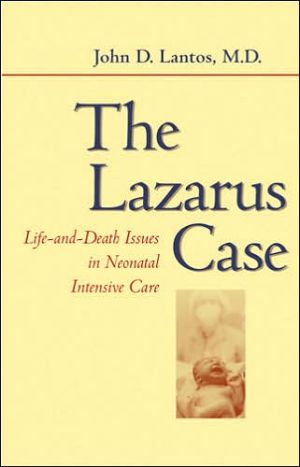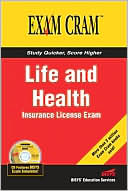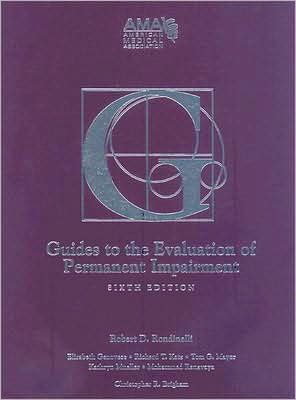The Lazarus Case: Life-and-Death Issues in Neonatal Intensive Care
In this new, startlingly original book, John D. Lantos weaves a compelling story that captures the dilemmas of modern medical practice. The Lazarus Case: Life-and-Death Issues in Neonatal Intensive Care begins with a fictional malpractice case—an amalgam of typical cases in which Lantos appeared as an expert witness—and uses it as the framework for addressing the ethical issues surrounding neonatal intensive care. Lantos draws on his experience in neonatal medicine, pediatrics, and medical...
Search in google:
Outstanding Academic Title, 2003, Choice MagazineIn this startlingly original book, John Lantos weaves a compelling story that captures the dilemmas of modern medical practice. The Lazarus Case begins with a fictional malpractice case -- an amalgam of typical cases in which Lantos has testified as an expert witness -- and uses it as the framework for addressing the ethical issues surrounding neonatal intensive care. Lantos draws on his experience in neonatal medicine, pediatrics, and medical ethics to explore multiple ethical dilemmas through one poignant representative situation. Hilde L. Nelson Lantos's insights are thoughtful, his empirical and sociological research is impeccable. His insistence that moral agency is possible despite the fact that society heavily shapes our practices and ways of thinking is ultimately as refreshing as it is convincing. I know of no other book like this one.
PrefaceAcknowledgments1Somebody Will Pay12Passing Out in the NICU253Learning about Death and Dying354Standards of Care545Prognostication and Futility646Consent, Communication, Shared Decision Making827Getting Paid1068Home Births1239Mistakes in Context14110Closing Argument157Notes167Index179
\ New PhysicianLantos presents an eye-opening and thought-provoking discussion in a unique style... Lantos is honest and voices some of the questions that many, if not all, physicians and medical ethicists have probably thought about... A must-read for all physicians, [and] especially important for those interested in pediatrics, neonatology, geriatrics, or any aspect of medicine that involves life–vs.–death decisions.\ \ \ \ \ Baylor University Medical Center ProceedingsThis book is a good read for anyone working in modern health care and involved or interested in any way with the difficult and frustratingly ambiguous decisions that must be made daily while caring for the critically ill.\ — Jonathan M. Whitfield, M.D.\ \ \ \ ChoiceThis outstanding book is one of the most important on medical ethics in the past ten years... It is authored by a physician who views issues of the day firsthand in a thoughtful, realistic, and consistent style. The result is elegant and highly readable. Lantos examines ethical problems of neonatal intensive care through his depositional testimony regarding a child who unaccountably survived after treatment was stopped; the result was severe neurological deficit. This device allows Lantos to make cogent but never doctrinaire comments on our judicial system and the progress of technology at the expense of humanity... A must read for physicians, health authorities, and all who in desiring justice imbued with moral acceptance recognize that medical certitude is beyond our powers.\ \ \ \ \ National Catholic Bioethics QuarterlyThe Lazarus Case is recommended for anyone who is involved in patient care and clinical decision making, and will be an effective resource for teaching bioethics to undergraduate, nursing, and medical students.\ \ \ \ \ Religious Studies ReviewThe very readable text offers a compelling perspective, both personal and professional, on a tragic situation that illuminates how difficult it is to determine whether any treatment decision is right or wrong, despite the law's best efforts to render such verdicts.\ — Felicia G. Cohn\ \ \ \ \ \ Journal of the American Medical AssociationCompelling. Lantos's narrative style makes for pleasurable reading; once you start a given chapter it is difficult to put his book down. He is at his best when sharing his personal experiences in the clinical realm and insights from relevant nonmedical literature. I am confident it will generate important discussions within our group that will benefit each of us and the infants and families we care for.\ \ \ \ \ New England Journal of MedicineLantos has taken an important practical problem and applied our understanding of moral and ethical theory to the issue of the appropriateness of care. An important message here is that in the context of this particular case, there are no right or wrong answers to questions posed.\ \ \ \ \ Medical Humanities ReviewA literate, thoughtful, and provocative work... An excellent way for experts and novices in bioethics, health professionals, and the lay public to be exposed to the complexities of ethical dilemmas in medicine.\ \ \ \ \ Hilde L. NelsonLantos's insights are thoughtful, his empirical and sociological research is impeccable. His insistence that moral agency is possible despite the fact that society heavily shapes our practices and ways of thinking is ultimately as refreshing as it is convincing. I know of no other book like this one.\ \ \ \ \ Library JournalLantos (Do We Still Need Doctors?) here draws on his personal experiences as a pediatrician and medical ethics expert at the University of Chicago to consider the complexities involved in neonatal intensive care. Using an idealized malpractice case to illustrate his points, he discusses the history, culture, and economics of neonatal care, considering when treatment should be given and withheld, who determines how aggressively life-support treatment should be pursued, and who should participate in treatment decisions. Lantos skillfully shows how difficult it is to determine standards of care for these tiny babies. Many books have been published about the ethical dilemmas surrounding premature births, but this title, written in a style that should appeal to general readers, stands out as a solid introduction to these issues. Recommended for public and academic libraries. Tina Neville, Univ. of South Florida Lib. at St. Petersburg Copyright 2001 Cahners Business Information.\ \








